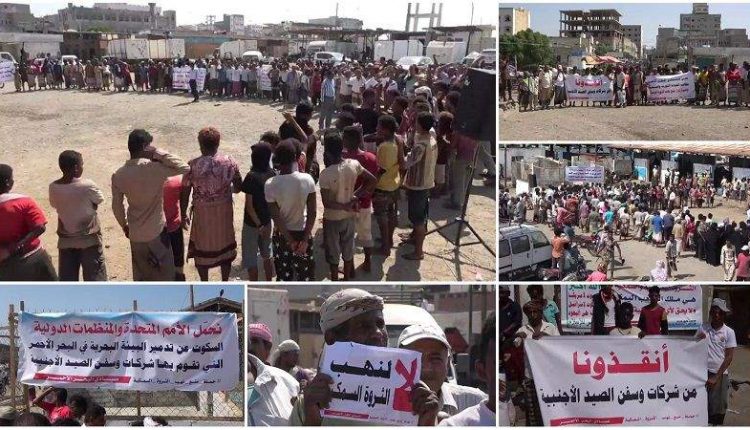Fishermen Condemn US-Saudi Looting of Marine Wealth
Fishermen in Al-Hodeidah Governorate organized a protest to denounce the looting, the destruction of the marine wealth, and the piracy carried out by the coalition of aggression in Yemen’s territorial waters.
During the protest, the Hodeidah Governorate’s Undersecretary for Culture and Media Affairs, Ali Qishr, affirmed the Yemeni people’s rejection of the criminal practices carried out by the coalition of aggression to waste marine wealth and the unjust dredging of fish, marine life and coral reefs in the Red and Arab Seas which is a flagrant violation to international conventions.
They called for standing together to prevent such practices carried out by the US-Saudi aggression, to loot the marine wealth, which represents a right for the Yemeni people and a source of income for many workers.
The deputy governor stressed that the Yemeni people will not remain idly by regarding such practices carried out by the coalition of aggression.
Meanwhile, the Assistant Undersecretary of the Ministry of Fisheries, Mustafa Hataba, referred to the legendary steadfastness of Hodeidah’s fishermen, despite the dangers they are faced by the aggression.
He demanded that all measures be taken to prevent the looting of marine wealth in the Red Sea, pointing out that many fishing companies, affiliated with the aggression countries, exploited the fish wealth and dredged them illegally under the protection of the battleships of aggression.
Hataba stressed the importance of everyone’s role in protecting and preserving fisheries and taking all measures to prevent their looting and depletion.
For his part, Director General of Ports and Fishing Landings, Aziz Atini, pointed out the importance of working together to prevent such practices and take deterrent measures to stop the looting that affects the fish sector.
A statement issued by the protest condemned the systematic looting of marine wealth in the Red Sea by the US-Saudi-Emirati aggression.
The statement denounced the piracy practiced against fishermen, kidnapping, attacks, confiscation of their boats and not allowing them to practice the fishing profession, which is the main source of income and their only source of livelihood.
The statement condemned the silence of the international community and all international human rights and human rights organizations, calling for taking firm stances against these aggressive and irresponsible behaviors to stop the tampering with the marine environment and the destruction of fisheries.
The statement called on the concerned authorities to consider all foreign fishing vessels as legitimate targets for the missile force, the navy and the air force.
The Governor of Aden, Tariq Sallam, warned the forces of aggression and occupation against continuing to loot Marine wealth and kidnapping and killing fishermen in Yemens’ coasts and waters.
Governor Sallam stated, in a statement quoted by Saba Agency, that Yemen, represented by the Salvation government, will spare no effort to protect the country’s capabilities and wealth, defend the rights of Yemenis to fish freely, and deter anyone who tries to use Yemen’s coast for his own ambitions. He stressed that the Yemeni coasts and waters will not be permissible for the aggressors.
He pointed out that the geographical location of Yemen made it the target of the ambitions of external forces seeking to exploit the country’s marine wealth, loot its resources, and deprive the Yemeni people of their rights.
Sallam pointed out that Yemen, while it seeks honorable peace, will not accept that its capabilities and rights are within the reach of invaders and greedy people from any country.
He said, “the operation of the Armed Forces in the port of Dhabba is only the tip of the iceberg, especially after the leadership’s directives and the constant warnings to foreign companies that are working to plunder Yemen’s wealth,” stressing that Yemen will protect its land, sovereignty and the rights of its people.
The governor of Aden indicated that the forces of aggression made the occupied governorates a private property, to practice looting and tampering with their wealth, and to exploit the people’s resources, which is rejected by all the Yemeni people, warning the countries of aggression against continuing to use the coasts of Yemen and looting its wealth.
He stressed that the Yemeni people will continue to move towards restoring the full Yemeni sovereignty and protecting the rights and gains of the nation.
On Thursday, The governor of Hodeidah, Mohammad Quhaim, warned fishing companies not to approach the coasts of the Republic of Yemen, especially the West Coast.
Governor Quhaim said, in a tweet, that looting oil is like looting fisheries, all of which are wealth for the homeland.
Saudi Arabia and many of its allies have been waging a war on Yemen since 2015 to restore power to the country’s Riyadh-friendly former officials. The war and a simultaneous siege that the US-Saudi-led coalition has been enforcing on the country has killed hundreds of thousands of Yemenis.
The invasion has pushed entire Yemen close to the brink of outright famine, turning the country into the scene of the world’s worst humanitarian crisis.
Coastal communities in Yemen have suffered greatly in the ongoing bloody war. Fishing boats, ports and processing sites have been destroyed or damaged, and many fishermen have lost their lives.
The US-Saudi-led coalition launched airstrikes which hit fishing boats and markets, and mines were laid in the sea making the waters treacherous. To make matters worse, the exacerbation of piracy and attacks by the Eritrean authorities and the aggression forces against fishermen on the Yemeni coasts.
As of August 2019, at least 334 fishermen had been reported killed or injured since 2015, according to statistics from Yemen’s fisheries authority. Others had been arrested and had their boats seized, while some were now detained in Saudi-run prisons in Yemen.
Local reports estimate that of Yemen’s approximate 100,000 fishermen, since 2015 over a third (37,000) have quit and thus lost their income.fishermen and the fish sector in Yemen.

